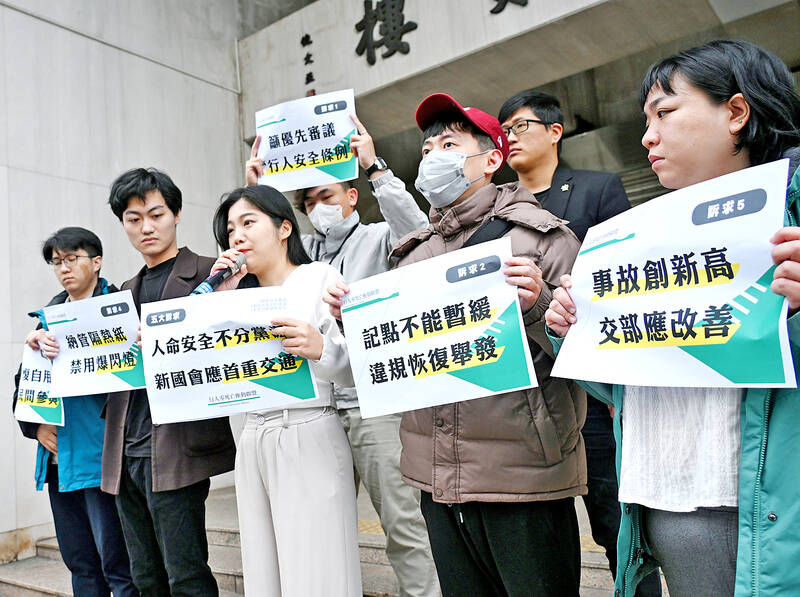Members of Vision Zero Taiwan yesterday urged the Ministry of the Interior’s National Land Management Agency to introduce a draft pedestrian safety facility act that would have clear regulations regarding sidewalks and covered walkways along streets.
All three main political parties should fully support the passage of the bill in the upcoming legislative session, the pedestrian rights group said.
Although the Legislative Yuan last year enacted the Road Traffic Safety Basic Act (道路交通安全基本法), 2,759 people died in the traffic accidents from January to November last year, the group said.

Photo: Fang Pin-chao, Taipei Times
Meanwhile, the number of serious traffic accidents soared to a record-high 367,311 during the same period last year, up 28,897 from the same period in 2022, it said.
The group attributed the rise of serious traffic accidents to the Ministry of Transportation and Communications’ decision in November to suspend the implementation of the penalty point system for illegal parking and other breaches of traffic regulations, which was not replaced by any contingency plan either.
The government should aim to reduce deaths caused by traffic accidents by comprehensively reviewing road designs, transportation education and thoroughly implementing traffic regulations, the group said.
“We also urge the National Land Management Agency to quickly submit its proposed version of the draft pedestrian safety facility act, so that it can be delivered to the upcoming legislative session for deliberation after the Executive Yuan reviews and approves it,” it said.
Alliance chairwoman Chen Kai-ning (陳愷寧) said that the draft act can be improved.
First, sidewalks should be installed on roads that are 8m in width or wider. Roads that are less than 8m in width should have marked sidewalks and curbs to designate the transition. Streets or alleys that are too narrow to have sidewalks or marked sidewalks could be accessed by pedestrians and motor vehicles, but pedestrians should have right of way, she said.
Second, the central government should stipulate fundamental principles for public facilities that are allowed to be placed on sidewalks, as this would prevent local governments from overcrowding sidewalks with utilities, making them inaccessible to pedestrians, Chen said.
Third, temporary walkways that are set up near construction sites or while roads are being maintained should be identical nationwide and take into account the needs of all pedestrians, including parents with baby strollers and physically challenged people, she said.
Fourth, while the draft act categorizes covered walkways or private properties along roads as part of the space designated for pedestrians, sidewalks should still be built, Chen said.
“Improving covered walkways takes way too much time and would be difficult to implement given often vague details of the improvement projects proposed by local governments. It would not serve the best interest of pedestrians,” she said.
Taiwan Motorcycle Riders Association secretary-general Liu Cheng-chien (劉成謙) said that the government should ban car drivers from using window film that is too dark, as drivers cannot see motorcycle riders and pedestrians at night.

Chinese Nationalist Party (KMT) Chairman Eric Chu (朱立倫), spokeswoman Yang Chih-yu (楊智伃) and Legislator Hsieh Lung-chieh (謝龍介) would be summoned by police for questioning for leading an illegal assembly on Thursday evening last week, Minister of the Interior Liu Shyh-fang (劉世芳) said today. The three KMT officials led an assembly outside the Taipei City Prosecutors’ Office, a restricted area where public assembly is not allowed, protesting the questioning of several KMT staff and searches of KMT headquarters and offices in a recall petition forgery case. Chu, Yang and Hsieh are all suspected of contravening the Assembly and Parade Act (集會遊行法) by holding

PRAISE: Japanese visitor Takashi Kubota said the Taiwanese temple architecture images showcased in the AI Art Gallery were the most impressive displays he saw Taiwan does not have an official pavilion at the World Expo in Osaka, Japan, because of its diplomatic predicament, but the government-backed Tech World pavilion is drawing interest with its unique recreations of works by Taiwanese artists. The pavilion features an artificial intelligence (AI)-based art gallery showcasing works of famous Taiwanese artists from the Japanese colonial period using innovative technologies. Among its main simulated displays are Eastern gouache paintings by Chen Chin (陳進), Lin Yu-shan (林玉山) and Kuo Hsueh-hu (郭雪湖), who were the three young Taiwanese painters selected for the East Asian Painting exhibition in 1927. Gouache is a water-based

Taiwan would welcome the return of Honduras as a diplomatic ally if its next president decides to make such a move, Minister of Foreign Affairs Lin Chia-lung (林佳龍) said yesterday. “Of course, we would welcome Honduras if they want to restore diplomatic ties with Taiwan after their elections,” Lin said at a meeting of the legislature’s Foreign Affairs and National Defense Committee, when asked to comment on statements made by two of the three Honduran presidential candidates during the presidential campaign in the Central American country. Taiwan is paying close attention to the region as a whole in the wake of a

OFF-TARGET: More than 30,000 participants were expected to take part in the Games next month, but only 6,550 foreign and 19,400 Taiwanese athletes have registered Taipei city councilors yesterday blasted the organizers of next month’s World Masters Games over sudden timetable and venue changes, which they said have caused thousands of participants to back out of the international sporting event, among other organizational issues. They also cited visa delays and political interference by China as reasons many foreign athletes are requesting refunds for the event, to be held from May 17 to 30. Jointly organized by the Taipei and New Taipei City governments, the games have been rocked by numerous controversies since preparations began in 2020. Taipei City Councilor Lin Yen-feng (林延鳳) said yesterday that new measures by